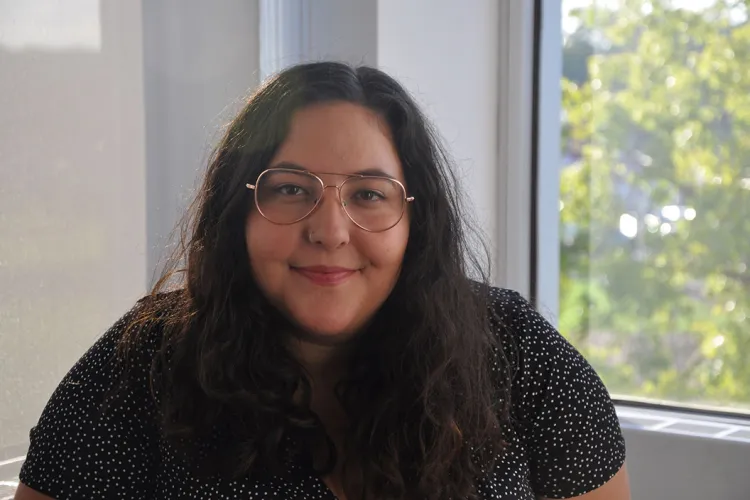The Front Lines of Change: Defending the Rights of Immigrants and Asylum Seekers

“I would not have been born without immigration laws that allowed people experiencing violence a chance to seek safety,” says Olivia Robbins ’21, who spent the summer as a remote communications intern for the Innovation Law Lab, a nonprofit based in Portland, Ore.
For many Swarthmore students, the summer of 2020 has been a time of activism and agency as they organize, overcoming COVID-19 limitations, and work to make positive change in their communities through a variety of initiatives. This is the fifth in a series of stories about their effort and success in engagement for social justice.
Previously: Making the Black Experience Visible; Helping Low-Income Students Translate Their Experiences; Bringing Computer Science Education to Chester and Beyond; Podcasting About Race, Higher Education, and Career Building
During the school year, Olivia Robbins ’21 tutors incarcerated people in Chester as part of the Petey Greene Program, whose Swarthmore chapter she co-founded. After the College sent students home to prevent the risk of spreading COVID-19 in March, Robbins worried not only about the safety of students she works with but also about how migrants detained in the U.S. would be protected from the coronavirus.
“I was thinking a lot about how the pandemic is going to affect the guys that we work with in Chester, just because social distancing is impossible in prison,” she says. “That led me to thinking about how the immigrants who are imprisoned in detention centers are going to be affected.”
Now, she’s working to improve conditions for those immigrants in her role as a remote communications intern for the Innovation Law Lab, a nonprofit based in Portland, Ore. Law Lab unites lawyers, coders, activists, and graphic designers to extend legal protections and defend immigrants and asylum seekers.
Robbins has translated Law Lab’s COVID-19-related work to wider and younger audiences with infographics, data visuals, and blog posts. Recently, she created several Instagram posts explaining the Trump administration’s April 22 executive order suspending immigration. Law Lab was one of several litigators to file the first case challenging the ban in its entirety in late May. Washington, D.C., 22 states, and tech companies including Facebook and Amazon recently filed amicus curiae briefs in support of the suit.
Robbins has also written about the Oregon Worker Relief Fund (OWRF) for undocumented workers and BorderX, a project at Law Lab that trains volunteers to support the legal release of immigrants from detention. As of July 31, more than $12.6 million had been distributed to 7,365 undocumented Oregonians by the OWRF.
As an intern, Robbins has also been able to hear stories from many asylum seekers and detainees, and has observed the process of legal aid in action.
“I’m learning a lot about the U.S. immigration system,” she says. “Detention centers are always really violent and dangerous places to be. But with COVID, I think that danger is just heightened.”
She says that so far, she has learned about “asylum-free zones,” where it’s an open secret that judges almost never award asylum; courts that have yearslong case backlogs; and penalties that immigration judges incur for failing to complete cases quickly enough. At the beginning of the pandemic, she learned about immigrants at the Mesa Verde detention facility in Bakersfield, Calif., who staged a hunger strike in response to food security and COVID-19 safety issues. Robbins, who is bilingual, also helped prepare a plaintiff to speak to media about the COVID-19 immigration visa ban.
“Hearing about those kinds of stories, it really just makes this work feel more urgent,” she says.
Robbins’s interest stems in part from her extensive studies of borders and migration as a peace & conflict studies major and Latin American & Latino studies minor. Last fall, she took Civil Wars and Neoliberal Peace in Central America with Associate Professor of Spanish Nanci Buiza, which culminated in a research project probing the conditions at the U.S.-Mexico border and in detention facilities. She says this course led her to seek out an internship relating to immigrant detention.
“Professor Buiza’s class taught me not just about regional conflicts, but also about the impacts of those conflicts on individual lives,” she says.
The work is also personal for Robbins. Her mother moved to the U.S. after experiencing political turmoil in Ecuador, and her father’s family came to the U.S. to escape persecution of Jews in Russia.
“I would not have been born without immigration laws that allowed people experiencing violence a chance to seek safety,” she says. “Just being given the opportunity to support asylum seekers and to work towards building a more just migration system in the U.S. has been really empowering.”



